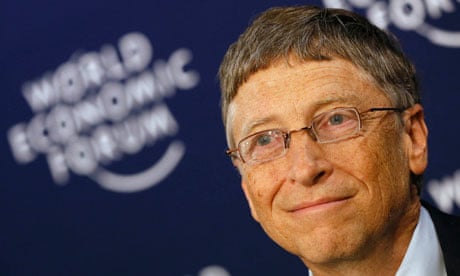Here's a riddle to kick us off: what do an American sanitation company and the annual Richard Dimbleby lecture have in common? The answer, surprisingly, is Bill Gates. Not just a dab hand at revolutionary technology; Gates also happens to be the principal shareholder in Republic Services – the second-largest waste management company in America. He has also been chosen to deliver the 2013 Richard Dimbleby lecture, thanks to his status as "one of the world's most generous philanthropists".
Gates will use the lecture as an opportunity to share his vision of a polio-free world, and how he is planning to use his wealth and influence to eradicate this debilitating disease once and for all.
Given that polio is primarily transmitted via the gruesome faecal-oral method, one might assume that Gates is committed to excellent standards of sanitation in every corner of the globe. One might also assume, therefore, that Gates also ensures the waste management company he has invested in, Republic Services makes excellent sanitation the only priority of its operation – more important than making profits.
Alas, if you did make these assumptions about Bill Gates, you would be wrong. For as he jets off around the world to promote polio vaccinations and "environmentally friendly toilet seats", Republic Services is locking out its workers as part of an industrial dispute, a practice which may jeopardise the sanitation of American communities. According to the Teamsters union, which represents the employees of Republic Services, workers have been subject to lockouts for protesting against the destruction of already modest pensions, unpaid overtime, and illegally abandoning contracts agreed upon with the union. In 2012, Republic Services' practice of locking out protesting workers led to stoppages in at least 13 American cities. Teamsters has called on Gates to use his wealth and influence – that same wealth and influence he's planning to use to eradicate polio – to put an end to this dispute. So far Bill Gates has not responded.
There's a fable in this, about philanthropy, isn't there? The model that has allowed Bill Gates to be depicted as benevolent by an uncritical BBC, and its connection to the model towards which our society seems to be hurtling, as a welfare state is gradually replaced by a voluntary "big society". Perhaps the Republic Services dispute indicates that relying upon the generosity of billionaires is not a model upon which we can build a just and equal society – especially since the road to billionaire-dom oft seems paved with exploitation of workers, tax avoidance (hello Microsoft), and ever-decreasing wages. Indeed, if the kindness of the rich was a realistic route out of poverty, we wouldn't have a problem: according to Oxfam the richest 100 people (of which Bill Gates is one) have already made enough money in a single year to end global poverty four times over. And yet here we are, waiting for our public service broadcaster to obligingly transmit the musings of a billionaire on poverty, while Republic Services wrings the wages of its workers to enlarge the fortunes of said billionaire. There is no doubt that Gates, in the amount donated, is one of the most generous people on the planet, but isn't there something wrong with this picture?
The common defence of billionaires like Bill Gates is that we should all be grateful to him for spending his fortunes on eradication of polio instead of, say, a galline Parthenon in which to house chickens. That's a fair point; generosity should not preclude criticism, either of a system that allows grotesque wealth inequalities, or of Bill Gates himself. Could Gates not persuade Republic Services to treat its workers more fairly, end the tax avoidance schemes of Microsoft, as well as engaging in (tax exempt) charitable donations? Could he attempt to live the spendthrift life of a multi-multi-multi-millionaire as opposed to multi-multi-multi-billionaire, for the greater good? In the end, how much money does one person need?
I'm going to watch the Richard Dimbleby lecture on Tuesday evening, and I expect I will agree with Bill Gates' dream of a better world. Only for me, that better world will only materialise when billionaires are held accountable for their actions, not praised for offering us a few crumbs from their table. Yes Bill Gates should be praised for his charity. But that's just what it is: charity. And as Augustine wrote over 1,500 years ago, charity is no substitute for justice withheld.
